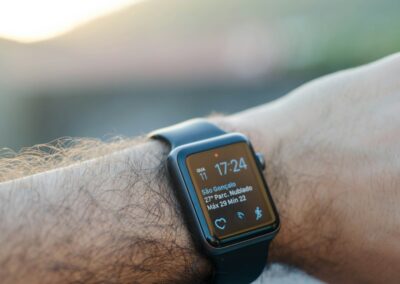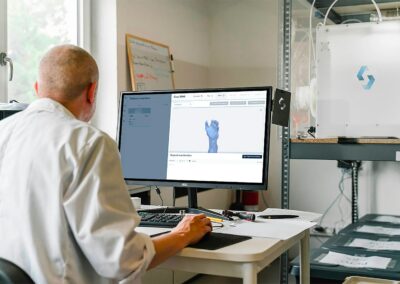Introduction to Wearable Tech in the Modern Workplace
The Rise of Wearable Technology
In recent years, wearable tech has surged in popularity, becoming an integral part of personal and professional lives. From smartwatches to advanced fitness trackers, these devices offer valuable insights into health and performance. In business hubs like Saudi Arabia, UAE, Riyadh, and Dubai, the adoption of wearable tech is increasingly seen as a means to enhance workplace efficiency and employee well-being. However, integrating these technologies into the workplace raises several ethical considerations that businesses must address to ensure responsible use.
Wearable tech provides real-time data on various health metrics, such as heart rate, physical activity, and stress levels. Companies see the potential of these insights to improve employee productivity, reduce healthcare costs, and foster a healthier work environment. The deployment of these devices can lead to a more engaged and motivated workforce, with employees benefiting from personalized health recommendations and performance feedback. However, this potential comes with significant responsibilities.
Balancing Benefits and Privacy
The primary ethical challenge of using wearable tech in the workplace is balancing the benefits of data collection with respect for employee privacy. Wearable devices collect vast amounts of personal data, which, if not handled properly, can lead to privacy infringements and misuse. Companies must establish clear guidelines on what data is collected, how it is used, and who has access to it. Transparency is crucial to build trust among employees and ensure they feel comfortable using these technologies.
Employers should implement robust data protection measures to safeguard sensitive information. This includes encryption, secure data storage, and regular audits to prevent unauthorized access. Additionally, employees should have control over their data, including the ability to opt out of certain data collection practices. Companies must communicate clearly about the purposes of data collection and provide assurances that the information will not be used to discriminate or unfairly penalize employees.
Informed Consent and Voluntary Participation
Informed consent is a cornerstone of ethical data collection. Employees must be fully aware of what data is being collected, how it will be used, and the potential implications of its use. Consent should be obtained through a transparent process, ensuring that employees understand their rights and the benefits of participating. Participation in wearable tech programs should always be voluntary, with no coercion or undue pressure from management.
Voluntary participation ensures that employees feel respected and valued, fostering a positive workplace culture. Companies should provide incentives for participation, such as health benefits or wellness programs, rather than making it a mandatory requirement. This approach not only upholds ethical standards but also promotes higher engagement and acceptance among the workforce.
Implementing Ethical Wearable Tech Policies
Developing Clear Policies and Guidelines
To navigate the ethical landscape of wearable tech in the workplace, companies must develop clear policies and guidelines. These policies should outline the objectives of wearable tech initiatives, the types of data collected, and the measures in place to protect employee privacy. Regular training and communication are essential to ensure that all employees understand and comply with these guidelines.
Policies should also address the potential misuse of data, such as using health information to make employment decisions. Companies must commit to using data solely for the intended purposes of improving health and performance, avoiding any actions that could lead to discrimination or unfair treatment. By establishing a strong ethical framework, businesses can mitigate risks and foster a culture of trust and transparency.
Ensuring Fairness and Non-Discrimination
One of the critical ethical considerations is ensuring that wearable tech does not contribute to workplace discrimination. Data collected from wearable devices should never be used to make decisions about hiring, promotions, or disciplinary actions. Instead, the focus should be on using the insights to support employee well-being and performance improvement.
Employers must be vigilant to ensure that no employee is disadvantaged based on the data collected. This includes being mindful of differences in physical abilities and health conditions, which may affect the data generated by wearable devices. Providing accommodations and support for employees with varying needs ensures that the technology is inclusive and fair.
Promoting Employee Well-Being
The ultimate goal of implementing wearable tech in the workplace should be to enhance employee well-being. Companies should leverage the data collected to develop comprehensive wellness programs that address the specific needs of their workforce. This could include stress management initiatives, fitness challenges, or personalized health recommendations.
By focusing on well-being, employers can create a positive impact on both employee health and organizational performance. Employees who feel supported and valued are more likely to be engaged, productive, and loyal to the company. Moreover, a commitment to well-being can enhance the company’s reputation as a responsible and ethical employer, attracting top talent and fostering long-term success.
Conclusion
The integration of wearable tech into the workplace offers significant potential benefits, from improved health outcomes to enhanced performance. However, these benefits must be balanced with a strong commitment to ethical practices. By prioritizing privacy, informed consent, and fairness, companies can navigate the challenges and leverage wearable tech to create a healthier, more productive work environment.
In regions like Saudi Arabia, UAE, Riyadh, and Dubai, where innovation and technology are highly valued, businesses have the opportunity to lead by example. By adopting ethical guidelines and transparent practices, they can set a standard for the responsible use of wearable tech, ensuring that it serves the best interests of both employees and the organization.
As wearable technology continues to evolve, ongoing dialogue and collaboration between employers, employees, and policymakers will be essential. Together, we can ensure that these advancements contribute positively to the future of work, fostering environments where technology and human well-being coexist harmoniously.
—
#WearableTech #EmployeeHealth #WorkplaceEthics #PerformanceMonitoring #AI #Blockchain #ExecutiveCoaching #GenerativeAI #ModernTechnology #BusinessSuccess #Leadership #SaudiArabia #UAE #Dubai #Riyadh























